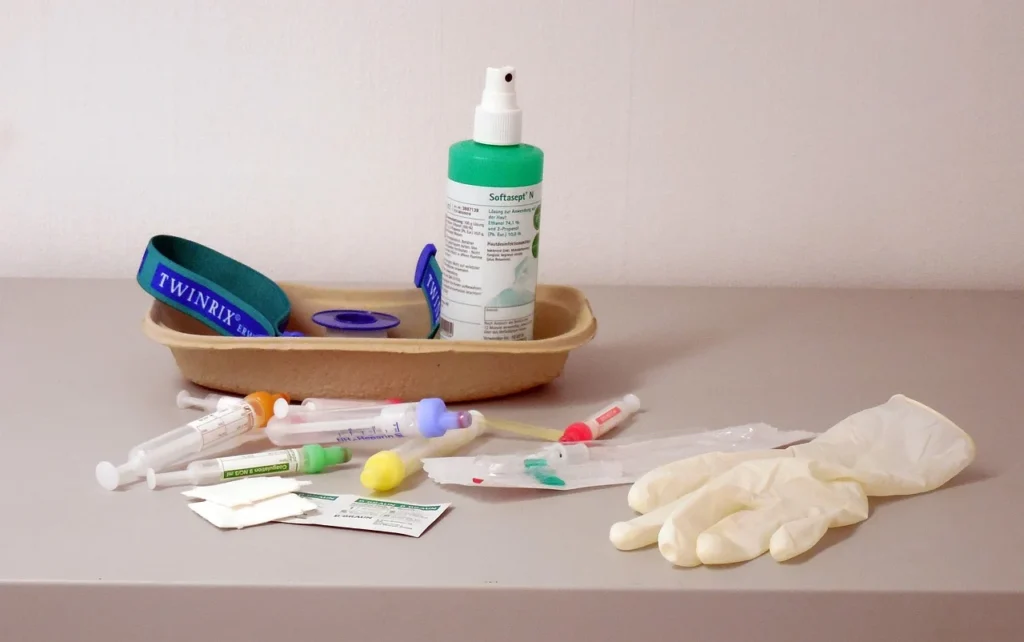A Family Health Checklist in the USA Over 60 Revitalize Your Dynamic Healthv
- Introduction
- The Importance of Regular Health Check-ups.A Family Health Checklist in the USA
- Ensuring a Balanced Diet for Every Family Member.
- The Significance of Physical Activity.
- Mental and Emotional Well-being
- Understanding the Importance of Vaccinations.
- Prioritizing Sleep
- Regular Dental Check-ups
- Understanding Your Family’s Medical History
- Screen Time and Tech Use Limits
- Hydration: A Vital Aspect of Family Health
- Conclusion
- FAQs
- 1.What is the importance of having a family health checklist for individuals over 60 in the USA?
- 2.What are the key areas covered in the family health checklist?
- 3. How often should individuals over 60 undergo health checkups?
- 4. Are there specific dietary recommendations for individuals over 60 mentioned in the checklist?
- 5. What role does physical activity play in the family health checklist?
- 6. How does the checklist address mental health for individuals over 60?
- 7. Are there any specific preventive measures mentioned in the checklist?
- 8. Can the family health checklist be customized for individual needs?
- 9. How can family members collaborate to ensure the well-being of individuals over 60 using this checklist?
- 10. Where can I find additional resources to supplement the information in the family health checklist?
Introduction
Maintaining family wellness in America is about more than managing the occasional illness. It’s a complete regimen that includes routine checkups, adjusted slims down, actual work, mental well-being, proper rest, vaccinations, dental health, understanding family medical history, monitoring screen time, and staying hydrated. Here’s your complete guide to the Family Health Checklist in the USA
The Importance of Regular Health Check-ups.A Family Health Checklist in the USA

Customized health screenings are an integral part of the medical services puzzle. They play an important role in the fight against disease by recognizing potential health hazards before they escalate into serious problems. On the off chance that you adhere to your scheduled physical checkup, you take into consideration the early results of diseases, for example, diabetes, high blood pressure, and disease. A Family Health Checklist in the USA
Early detection often correlates with more compelling management and better outcomes. For the younger members of your family, these checkups are essential to follow their early progress. What else, for adults? These registrations are an opportunity to examine important life decisions – think about trends such as diet, actual work, and smoking. Thus, treat these traditional health check-ups not as a commitment, but as an interest in your Family’s Health Checklist in the USA
Read more:
20% of children ages 12-19 have obesity
Ensuring a Balanced Diet for Every Family Member.
Fortifying each relative with the right supplements is vital to their overall health. Eating a variety of organic produce, vegetables, lean protein, whole grains, and low-fat dairy products is important. A dynamic and stunning plate guarantees an attractive look as well as a combination of basic supplements. A Family Health Checklist in the USA
Be aware of portion sizes to try to reduce saturated fat, sugar, and sodium intake. Introducing children to standard food types early can help instill sustainable eating patterns, guiding them towards a healthy lifestyle. So, step into the kitchen, whip up these fixings, and serve up wellness on a plate! Keep in mind, that a healthy eating routine does more than just satisfy hunger, it’s an everyday part of your Family’s Health Checklist in the USA
Read more:
In 2019, only about one in 10 adults met recommendations for fruit and vegetable intake.
The Significance of Physical Activity.

Adopting quality real work is very important to stay solid and solid. It plays an important role in weight monitoring as well as supporting heart capacity and elevating the state of mind. The goal for adults should be 150 minutes of moderate oxygen consumption consistently. For the kids, go to sleep every day for a thrilling real effort. In any case, active work doesn’t have to feel like a chore or require re-centering. Basic behaviors such as brisk walks, cycling in the area, swimming in a nearby pool, or any case, chasing after your child all count. A Family Health Checklist in the USA
The actual work can likewise be an exceptional way to hold as a family, whether it’s playing a fun round of b-ball on the lawn, going to your #1 tunes, or going on a weekend hike. Make active work a regular part of your family routine and watch it improve your general well-being, with care. Keep in mind, that every step counts, so keep moving forward and keep thriving! A Family Health Checklist in the USA
Read more:
The obesity rate among U.S. kids has increased from 15.4% in 2005-2006 to 19.3% in the latest survey
Mental and Emotional Well-being
Maintaining the mind is as important as feeding the body. During the hustle and bustle of daily existence, it is important to make time for deep and spiritual well-being. It’s good practice to have a good conversation about feelings within the family, which empowers people to communicate, as opposed to stifling. It encourages stable connections and develops a positive mental self-view, leading to happier and stronger relationships. A Family Health Checklist in the USA
It is very important to recognize signs of stress, tension, or distress early. Pay particular attention to delayed changes in mood, appetite, or rest patterns as they may signal psychological well-being issues. Additionally, on the off chance that you have a family member struggling with them, feel free to contact a psychological well-being specialist.
Emotional well-being matters, and taking the appropriate action can make a significant impact. It’s important to remember that seeking help is not a sign of weakness, but a step toward strength. We must encourage a family environment where every feeling counts and every feeling matters. Mental and home well-being isn’t just one piece of your family’s wellness agenda, it’s the core of it. A Family Health Checklist in the USA
Read more:
1 in 4 adults don’t meet the global recommended physical activity levels, according to the WHO.
Understanding the Importance of Vaccinations.

Vaccination plays a fundamental role in protecting well-being, as a defense against a host of diseases. They are about individual well-being, but they also influence the local area by controlling the spread of incurable diseases. From basic youth antibodies to occasional flu shots and much more about immunizations to protect against the coronavirus. A Family Health Checklist in the USA
Keeping your family’s immunization plan up to date is important. Keep in mind, that immunizations are like an umbrella on a stormy day – they provide security when you need it most. Safety and feasibility are thoroughly tested before they are approved, and any side effects are usually mild and brief. So, roll up those sleeves and encourage your friends and family to do the same! Immunizations are an important part of your family’s wellness agenda, protecting us from preventable infections and their complications. We should own welfare, in exchange for each immunization! A Family Health Checklist in the USA
Prioritizing Sleep
Comfort is not just a luxury, but an indisputable necessity for your family’s well-being. It fills in as your body’s normal support system, helping you heal and restore. The American Foundation for Rest Medicine recommends rest — at least 7 hours for adults, and a corresponding amount for youth depending on their age. Stable, quality rest makes all the difference to your health by upgrading memory. A Family Health Checklist in the USA
Picking up mindfulness, and getting your body to function ideally. In any case, how do you guarantee that everyone is meeting the rest of their needs? Start by setting traditional rest plans, cultivating a calm dozing climate, and promoting a relaxed bedtime schedule. It is also important to emphasize the importance of rest to your children. Tell them that bedtime is not a discipline, but an important part of their daily routine, like brushing their teeth or eating dinner. There’s more to it than relaxation mode. This is your undisputed advantage to having a better, happier, and more productive family. A Family Health Checklist in the USA
Regular Dental Check-ups

Your family’s smiles are unmatched, and to keep them that way, a routine dental checkup is an absolute necessity. Oral wellness isn’t just about making those glorious whites shine; This is a window into your general health. A scheduled dental visit is an opportunity to keep cavities and gum disease under control, ensure proper oral hygiene, and rule out any potential problems like oral cancer. A Family Health Checklist in the USA
These routines include regular thorough cleanings, a thorough examination of your teeth, gums, tongue, and mouth, and, again, x-rays to look for problems. The American Dental Association recommends an exam like clockwork — two outings each year for a long-lasting sound smile. So, write in these schedules and remember, a standard dental check-up is not a chore, yet it is a promise for your family’s well-being. Try not to let those smiles fade, be aware of your dental dates! A Family Health Checklist in the USA
You also like:
Understanding Your Family’s Medical History
Uncovering your family’s medical past can serve as a basic guide to your family’s future. Finding out about your flock’s wellness history can provide valuable insight for your medical care provider, empowering them to anticipate potential health risks and devise appropriate preventive measures. A Family Health Checklist in the USA
From diabetes to malignant growths, from coronary disease to stroke, various medical problems run in families, and recognizing your inherent vulnerability can potentially save lives. This is fundamental to securing data on the well-being of your immediate family, including guardians, relatives, and youth, as well as insight into the prevalence of specific diseases in your more distant family. This proactive measure allows your primary care physician to zero in on conditions you may be bound to experience. Understanding your family medical history is not associated with anticipated disaster. It is about the functional well-being of the board.
Along these lines, start these discussions about wellness history at your next family gathering. Because when it comes to defending your family’s well-being, information truly is power! A Family Health Checklist in the USA
Read more:
Americans consume more than 3,400 milligrams (mg) of sodium per day, on average.
Screen Time and Tech Use Limits

In our increasingly computerized world, setting reasonable boundaries for the use of innovation within your family is fundamental. Excessive screen time can lead to a large group of problems, for example, sedentary behavior, eye strain, and disturbed rest patterns. A Family Health Checklist in the USA
To minimize these risks, it’s important to determine workable cut-off points for your kids’ tech use. Trade high-level associations for real commitment by pursuing disengagement exercises. Support the joy of turning the pages of a book, the joy of participating in sports, or the simple joy of family conversation. Evoke them to discover the intrigues of the computerized domain’s past. We shouldn’t overlook the valuable opportunity to show others how it’s done, because even the big guys can benefit from these tech breaks. A Family Health Checklist in the USA
Adjusting screen time doesn’t necessarily mean rejecting innovation, but it does ensure better use of it. We should mean holding tech under tighter restrictions and fostering a family lifestyle where screens don’t control, but only help.A Family Health Checklist in the USA
Also Read:
In high-income countries, 26% of men and 35% of women don’t get enough physical activity.
More than 80% of the world’s teens don’t get enough physical activity.
Commanding Vitality.Top Fun Ways to Stay Active as a Family in the USA Over 60
Hydration: A Vital Aspect of Family Health
Water is life – that’s all! The important function of hydration in our daily well-being is often misunderstood, yet it serves as a building block for various bodily processes.
Consider integration, supplement ingestion, and even temperature guidelines! It is fundamental to maintain water levels in our bodies for ideal health. The Foundation of Medication guidelines recommend 3.7 liters of water per day for men and 2.7 liters for women. For young children, the amount needed fluctuates depending on age, sex, and activity level. Keep in mind, that staying hydrated doesn’t just mean downing glasses of water. A Family Health Checklist in the USA
Natural products, vegetables, and various liquids count too! As such, we should raise a glass (of water, of course!) to health and keep hydrated. Simplify this act that is an indisputable part of your family’s daily routine. Because when it comes to wellness, every drop of hydration counts! Welcome to a better, happier family, each flavor in turn!
Read more:
conclusion
1. Maintaining your family’s well-being requires a comprehensive approach, addressing every aspect of lifestyle and health.
2. Standard well-being checkups provide a board of important early discoveries and infections, focusing on them for each relative.
3. Eat healthier with organic produce, vegetables, lean proteins, whole grains, and low-fat dairy items, while limiting unhealthy fats, sugars, and sodium.
4. Make real work an enjoyable, traditional part of your family routine – it keeps you fit, strengthens the heart, and boosts the mood.
5. Focus on mental and deep well-being, open dialogue, and awareness of emotional well-being issues.
FAQs
1.What is the importance of having a family health checklist for individuals over 60 in the USA?
Ensuring the health and well-being of family members over 60 is crucial for a fulfilling and comfortable life. This checklist serves as a comprehensive guide to address various aspects of their health and lifestyle.
2.What are the key areas covered in the family health checklist?
The checklist covers a wide range of areas, including regular health checkups, nutrition, physical activity, mental health, and preventive measures to enhance the overall quality of life for individuals over 60.
3. How often should individuals over 60 undergo health checkups?
While specific recommendations may vary, regular health checkups, including screenings for common age-related conditions, are generally advised annually. Consultation with healthcare professionals can help determine the most appropriate frequency based on individual health needs.
4. Are there specific dietary recommendations for individuals over 60 mentioned in the checklist?
Yes, the checklist includes dietary guidelines tailored to the needs of individuals over 60, emphasizing a balanced and nutrient-rich diet to support overall health, bone strength, and immune function.
5. What role does physical activity play in the family health checklist?
Physical activity is highlighted as a crucial component for maintaining mobility, strength, and cardiovascular health. The checklist provides suggestions for age-appropriate exercises and activities that can be incorporated into daily routines.
6. How does the checklist address mental health for individuals over 60?
Mental health is given due importance, with recommendations for activities that promote cognitive function, social engagement, and emotional well-being. Strategies for managing stress and staying mentally active are also included.
7. Are there any specific preventive measures mentioned in the checklist?
Yes, the checklist outlines preventive measures such as vaccinations, regular screenings for common age-related diseases, and safety precautions to create a secure living environment.
8. Can the family health checklist be customized for individual needs?
Absolutely. The checklist serves as a template that can be adapted based on individual health conditions and preferences. It is recommended to consult with healthcare professionals to tailor the checklist to specific health needs.
9. How can family members collaborate to ensure the well-being of individuals over 60 using this checklist?
The checklist encourages open communication and collaborative efforts among family members. It provides a framework for shared responsibilities, ensuring that all aspects of health are considered and addressed collectively.
10. Where can I find additional resources to supplement the information in the family health checklist?
The checklist includes references to reputable sources and healthcare organizations that offer additional information and resources to support the health and well-being of individuals over 60 in the USA.






